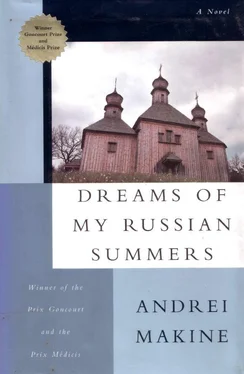The profound import of the confrontation was lost on us. But we could now make out, among five hundred pairs of eyes focused on the tsar, those who, without outward hostility, held back from the general enthusiasm. And who felt free to do so just because of this mysterious "democracy." This casual attitude filled us with consternation. We inspected the ranks of the black suits to discover potential troublemakers. The president should have identified them and expelled them by pushing them off the steps of Elysée!
The following evening our grandmother's lamp was lit on the balcony once more. In her hands we saw some newspaper pages she had just extracted from the Siberian suitcase. She spoke. The balcony slowly detached itself from the wall and hovered, plunging into the scented shadows of the steppe.
… Nicholas was seated at the table of honor, which was trimmed with magnificent garlands of medeola. At one moment he was listening now to some gracious remark from Madame Faure, seated on his right, at the next to the velvety baritone of the president, speaking to the empress. The reflections from the glasses and the glittering array of silver dazzled the guests… At the dessert the president stood up, raised his glass, and declared, "The presence of Your Majesty among us, acclaimed by a whole people, has sealed the bonds that unite our two countries in harmonious endeavor and in a mutual confidence in their destinies. The union between a powerful empire and an industrious republic… Fortified by a proven fidelity… As a spokesman for the whole nation, offer to Your Majesty… For the greatness of his reign… For the happiness of Her Majesty, the Empress… I raise my glass in honor of His Majesty, the Emperor Nicholas, and Her Majesty, the Empress Alexandra Fyodorovna."
The band of the Republican Guard struck up the Russian national anthem… And the grand gala at the Opéra that evening was an apotheosis.
Preceded by two torchbearers, the imperial couple ascended the staircase. They seemed to be moving past a living cascade: the white curves of the women's shoulders; the blossoming flowers on their corsages; the perfumed brilliance of the hairstyles; the glittering of jewels on bare flesh; all this against a background of uniforms and tails. The mighty cry "Long live the Emperor!" almost raised the majestic ceiling to the sky with its echoes, mingling it with the sky… When at the end of the performance the orchestra launched into the "Marseillaise," the tsar turned to the president and gave him his hand.
My grandmother switched off the lamp, and we spent several minutes in the dark, the time it took to let all the midges fly away that had been courting a luminous death beneath the shade. Little by little our eyes began to see again. The stars reformed their constellations. The Milky Way became phosphorescent. And in a corner of our balcony, among the intermingled stems of sweet peas, the fallen bacchante gave us her stone smile.
Charlotte paused in the doorway and sighed gently. "You know, it was a military march, in fact, nothing more, the 'Marseillaise.' A bit like the songs of the Russian revolution. At such times blood doesn't frighten anyone…"
She went back into the room, and it was from there that we heard these lines emerging, which she recited softly, like a strange litany from the past:
Over us the bloodstained banner
Of tyranny holds sway…
And drench our fields with their tainted blood…
We waited for the echo of these words to melt into the darkness, and then with one voice we exclaimed to one another, "And Nicholas? The tsar? Did he know what the song was about?"
* * *
France-Atlantis was revealing itself as a whole gamut of sounds, colors, and smells. As we followed our guides, we were discovering the different elements that made up this mysterious French essence.
The Elysée Palace appeared in the glitter of chandeliers and the shimmering of mirrors. The Opéra dazzled us with the nakedness of women's shoulders and made us drunk with the perfume exhaled by the magnificent hairstyles. For us Notre-Dame was a sensation of cold stone under a stormy sky. Yes, we could almost touch the rough, porous walls – a gigantic rock, shaped over the centuries, it seemed to us, by ingenious erosion…
These perceptible facets outlined the still-uncertain contours of the French universe. This emerging continent was filling up with things and people. The empress knelt on a mysterious prie-dieu that did not suggest any known reality. "It's a kind of chair with its legs cut off," explained Charlotte, and the image of this mutilated piece of furniture left us dumbfounded. Like Nicholas, we repressed the desire to touch the purple cloak with its tarnished golds, which Napoleon had worn on the day of his coronation. We craved the sacrilegious contact. This universe in gestation still lacked substance. In the Sainte-Chapelle it was the rough grain of an old parchment that aroused the same desire – Charlotte taught us that these long handwritten letters had been penned a millennium ago by a French queen, a Russian woman furthermore, Anna Yaroslavna, wife of Henri I.
But what was most exciting was that Atlantis was being built before our very eyes. Nicholas grasped a golden trowel and spread mortar on a great block of granite – the first stone of the Pont Alexandre-Ill… And he held out the trowel to Félix Faure – "Your turn, Monsieur le Président!" - and the racing wind, which was whiffing up white horses on the waters of the Seine, carried away the words forcefully uttered by the minister of trade as he battled against the flapping of the flags: "Sire! It was France's wish to dedicate one of the great monuments of her capital to the memory of your august father. In the name of the government of the Republic I ask Your Imperial Majesty to graciously consecrate this homage by joining the President of the Republic in cementing the first stone of the Pont Alexandre-III, which will link Paris to the Exhibition of 1900 – and thus to extend to our inauguration of this great enterprise of civilization and peace the lofty approbation of Your Majesty and the gracious patronage of the Empress."
The president barely had time to give two symbolic taps to the granite block before an incredible incident occurred. A fellow who belonged neither to the imperial entourage nor to the party of French dignitaries rose up before the imperial couple, addressed the tsar with the familiar tu , and with an extraordinary urbane dexterity, kissed the tsarina's hand! Petrified by such cavalier behavior, we held our breath…
Little by little it became evident what was happening. The words of the intruder, overcoming the distance in time and gaps in our French, were clarified. Feverishly we caught their echo:
Illustrious Emperor, Alexander's heir, France welcomes thee, on this occasion fair. In tongue of gods she bids me greetings bring; Poets alone may thus address a King.
We uttered a "phew" of relief. The insolent braggart was none other than a poet, whose name Charlotte told us was José Maria de Heredia!
And you, Madame, who on this happy day Alone a peerless loveliness display, Let me, through you, bestow an accolade On grace divine, of which your own is made!
The cadence of the verses intoxicated us. To our ears the resonance of the rhymes celebrated extraordinary marriages between words that were far apart: "stream-dream," "gold-untold."… We sensed that only such verbal artifices could express the exotic nature of our French Atlantis:
Behold the city! Fervent acclamation
From flag-decked Paris soars in celebration,
Where both in palace and in humble street
The three brave colors of our two lands meet…
'Neath golden poplars, all along her banks
The Seine conveys a joyful people's thanks.
Affection follows where our eyes may see:
France greets her guests with all her energy!
Читать дальше












